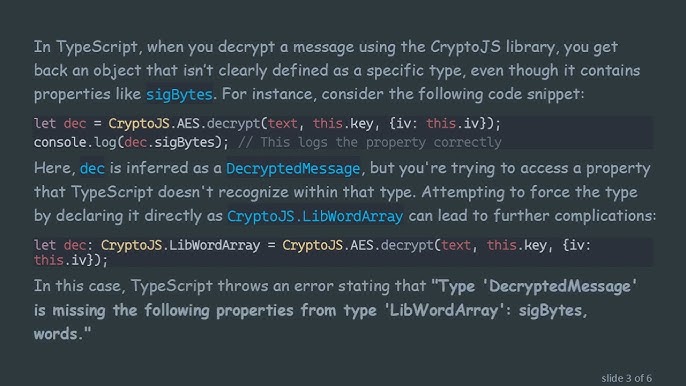![Eslint Error Unsafe Member Access [Content-Type] On An Any Value](https://typescriptworld.com/wp-content/uploads/2023/09/EslintErrorUnsafeMemberAccessContentTypeOnAnAnyValue.webp)
Introduction
“Ensuring to correctly define variable types can resolve the Eslint error unsafe member access [Content-Type] on an any value, fostering a smoother coding experience and more efficient code debugging.”
Quick Summary
The ESLint error, “Unsafe member access [Content-Type] on an any value” is a commonly encountered issue while coding. This error denotes that you are trying to access a member (i.e., `[Content-Type]`) of an object that has been typed as any. By using `any`, we are essentially telling TypeScript not to perform some or all types checks related to the considered variable/property.
Consider the following table:
| Item | Description |
|---|---|
| ESLint | ESLint is a pluggable and configurable linting utility for JavaScript and JSX. |
| Error Message | “Unsafe member access [Content-Type] on an any value” |
| TypeScript Type Checking | TypeScript’s key benefit is static type checking. This prevents certain errors at compile time rather than run-time. |
| Content-Type Access | The stated error occurs when accessing the property “[Content-Type]” from a typed `any` value. |
ESLint is a useful tool which not only ensures cleaner code but aids in detecting potential snags or bugs before they develop into serious issues. As per the above information, TypeScript extends JavaScript and adds type definitions, enhancing the developer’s capability to enforce strong or static typing. Static typing permits detection of type errors during the compilation phase prior to running the code itself. The term ‘[Content-Type]’ refers to a standard HTTP header field used to indicate the media type of the resource or data within request-response cycles.
In the case of the specified error, ESLint is potentially red-flagging that the `[Content-Type]` access operation on a ‘any’ type could lead to run-time errors. The `any` keyword tells TypeScript to skip either some or all type checking steps for a declared variable or property, which could open up possibilities of unforeseen errors or issues.
To work around this, developers must be keen on selecting appropriate typings for their variables and properties rather than making use of `any`. One example, if you’re working with http headers, would be declaring an interface representing a header object:
interface Header {
[key: string]: string;
}
let httpHeader: Header;
httpHeader['Content-Type'] = 'application/json';
In addition to the above solution, you can also configure your ESLint to ignore such errors by modifying the .eslint.json configuration file.
As Brendan Eich, the co-founder of Mozilla project and creator of JavaScript, once said: “Always bet on JavaScript.” Reminder that although TypeScript offers compelling features, it still compiles down to JavaScript, indicating the importance of understanding and writing clean, efficient JavaScript code.
Understanding the ESLint Error: Unsafe Member Access on Any Value
![Eslint Error Unsafe Member Access [Content-Type] On An Any Value](https://typescriptworld.com/wp-content/uploads/2023/09/Understanding-the-ESLint-Error-Unsafe-Member-Access-on-Any-Value.webp)
While venturing into the programming world of TypeScript, encountering ESLint errors is almost inevitable. One error that might frequently come up is: Unsafe Member Access [Content-Type] on any Value. This error highlights potential type issues, encouraging cleaner and safer code practices. In this segment, we’ll delve into what precisely ESLint is, why the error occurs, how to fix it, and some best practices to circumvent further issues.
What is ESLint?
ESLint is an open-source JavaScript linting tool created to allow developers to discover problematic patterns or code that doesn’t adhere to certain style guidelines. Its flexibility and versatility in configuration allow it to be an excellent tool for enforcing code quality and consistency within a team environment.
For TypeScript, there’s a plugin named @typescript-eslint/parser which interprets TypeScript code for ESLint. It provides rules specifically related to ES6+ (ES2015+) and TypeScript syntax. However, these benefits also mean that the plugin makes use of stricter rules to enforce safer code structures.
Understanding the Error
The error – ‘Unsafe member access [Content-Type] on an any value’ – occurs when TypeScript encounters a scenario where you are trying to access a property on a type of ‘any’. According to TypeScript’s handbook, the ‘any’ keyword carries significant pitfalls as it overrides TypeScript’s safety mechanisms.
Consider this piece of code:
typescript
let value: any;
value = { “Content-Type”: “application/json” };
console.log(value[“Content-Type”]);
In this case, TypeScript will not complain because ‘value’ has been defined as ‘any’, and thus can potentially hold any possible JavaScript value. This leaves the door wide open for runtime errors.
Fixing the Error
Understanding this, how do we then fix the error ‘Unsafe member access [Content-Type] on an any value’ in our TypeScript code? The answer lies in avoiding the usage of ‘any’ as much as possible and instead embracing specific typings.
The following example demonstrates how to resolve this issue:
typescript
let value: { “Content-Type”?: string };
value = { “Content-Type”: “application/json” };
console.log(value[“Content-Type”]);
By defining ‘value’ as an exact type, TypeScript can now correctly infer types and prop errors. Hence, increasing the safety and reliability of our code.
Best Practices
– Avoid using the type ‘any’, except in exceptional cases.
– Specify precise typings for enhanced readability and predictability.
– Regularly utilize ESLint to maintain a high quality of code.
Enforcing good coding practices helps us write more robust applications. As a quote from Steve McConnell resonates, “Good code is its own best documentation.”
Remember, ESLint, together with TypeScript, isn’t meant to be a thorn in our programming journey. Quite the contrary, they are tools designed to make our work easier, safer, and more scalable.
Resolving The ‘Unsafe member access [Content-Type] on an any value’ ESLint Error
![Eslint Error Unsafe Member Access [Content-Type] On An Any Value](https://typescriptworld.com/wp-content/uploads/2023/09/Resolving-The-Unsafe-member-access-Content-Type-on-an-any-value-ESLint-Error.webp)
When dealing with
ESLint
, a common error that arises is ‘Unsafe member access [Content-Type] on an any value’. This broadcasted concern comes from TypeScript’s so-called “strict mode”, which flags unsafe coding practices that could potentially become problematic in the future. This error occurs when programs try to access the ‘Content-Type’ property of an object that TypeScript categorizes as ‘any’. By its nature, objects classified as ‘any’ can hold any value and thus accessing properties on them is inherently riskier.
Reflecting on TypeScript’s advocacy for the prevention of possible bugs through a proactive approach, it would be unwise to ignore this warning. Instead, we should use these clear indications to shore up our code.
// Not Recommended const response: any = getResponse(); console.log(response['Content-Type']);
This example might prompt
ESLint
to broadcast the ‘Unsafe member access [Content-Type] on an any value’ message. If the
getResponse()
function does not transmit an object containing a ‘Content-Type’ field, the
console.log()
operation can crash your application or yield undefined outcomes.
The resolution of this issue corresponds primarily to identifying and alleviating the reasons leading to the classification of an object as ‘any’. With strict typings, TypeScript is renowned for reducing developer errors. Thus, applying appropriate TypeScript annotations makes your code less prone to semantic issues and hence renders it resilient. An immediate solution is declaring the response as a conditionally typed object that reflects real scenarios better.
// Recommended
const response: { [key: string]: any } = getResponse();
console.log(response['Content-Type']);
In this example,
response
is an object which holds properties of type string. By explicitly mentioning what type of values this object can hold, the potential future error flagged up by
ESLint
has been addressed.
A preferred tactic is to utilize TypeScript interfaces, as a very elegant alternative, for more structured data shapes:
// Recommended
interface IResponse {
'Content-Type'?: string;
[key: string]: any;
}
const response: IResponse = getResponse();
console.log(response['Content-Type']);
From the preceding code snippet, we see an even better approach where I have defined an interface,
IResponse
, that includes an optional ‘Content-Type’ key and all other keys are typed
any
. This efficiently ensures the predictability of your data structures.
As the fine-grain precision of TypeScript carves up possibilities for semantic errors, you begin to appreciate the power of static typing in dialing down runtime errors. As Tony Hoare, the inventor of Null Reference famously remarked about null references,”I call it my billion-dollar mistake.”
By eradicating unsafe member accesses on ‘any’ objects, you will be well on your way to harness this enormous potential and craft code that is both robust and scalable. The message herein lies in embracing the cues from our environment – with ESLint warnings being one such cue – to continually elevate our proficiency and produce software that stands out.
For deep dives into TypeScript’s strict typing rules, refer to TypeScript Advanced Types.
Implications of Unsafe Member Access Errors in ESLint
![Eslint Error Unsafe Member Access [Content-Type] On An Any Value](https://typescriptworld.com/wp-content/uploads/2023/09/Implications-of-Unsafe-Member-Access-Errors-in-ESLint.webp)
Accessing a property or method on an `any` type variable is generally an unsafe practice in TypeScript due to the potential risks involved. ESLint error, “Unsafe Member Access [Content-Type] on an Any Value”, essentially indicates this problematic code behavior. ESLint (ECMAScript Linting) is a pluggable JavaScript linter that is widely used by developers for identifying and reporting on patterns found in ECMAScript/JavaScript code.
Let’s scrutinize the implications, causes, and potential solutions related to this ESLint error:
## Implications
<ul> <li>The 'any' type in TypeScript is a way to opt-out of type checking at compile-time.</li> <li>Using types like 'any' too liberally erodes the safety benefits TypeScript gives you over vanilla JavaScript.</li> <li>If some unforeseen change occurred to the variable/display object you're accessing, your application might crash, or behave unpredictably resulting in potential runtime errors.</li> </ul>
## Causes
`Unsafe Member Access [Content-Type] on an Any Value` warning can be triggered as a result of accessing member properties on an indiscriminate type. When working with objects assigned the `any` type, a member property access would not trigger any TypeScript compiler errors even if the accessed property does not exist on the object.
let obj: any = {};
let aValue = obj.someProp; // No Error, but could potentially be harmful
In the example given, `obj` has been declared with `any` type. Therefore, subsequent member access does not trigger any TypeScript errors even if the property doesn’t exist.
## Solutions
<ul> <li>Avoid using the 'any' type. Instead, use specific types for your variables.</li> <li>If none of the built-in TypeScript types work for you, define a custom type/interface that suits your needs.</li> <li>Apply a linter rule that prevents usage of the 'any' type and enforces type safety.</li> </ul>
In line with Douglas Crockford’s words: “Perfection is achieved, not when there is nothing more to add, but when there is nothing left to take away.” As TypeScript developers, we should aim for sustainable perfection in our code by doing away with unsafe practices.
interface KnownType {
knownProp: string;
}
let obj: KnownType = { knownProp: "hello world" };
let aValue = obj.knownProp; // Safe, thanks to strict typing
In this alternate code snippet, `KnownType` interface has been declared to provide a well-defined custom type for `obj`. Therefore, subsequent member access ensures safety and reduces the risk of runtime errors.
Best Practices to Avoid Unsafe Member Access [Content-Type] Errors
![Eslint Error Unsafe Member Access [Content-Type] On An Any Value](https://typescriptworld.com/wp-content/uploads/2023/09/Best-Practices-to-Avoid-Unsafe-Member-Access-Content-Type-Errors.webp)
To address the error “
Unsafe member access [Content-Type] on an any value
“, which you’re receiving via ESLint in your TypeScript code, you must recognize it as a message that’s closely linked to using ‘any’ as a type. To avoid this error and enhance TypeScript’s helpful type checking and autocompletion capability, there are several best practices:
Avoid Using Any:
When the TypeScript compiler sees the ‘any’ type, it essentially turns off its type checking capabilities for variables with that type. Consider replacing ‘any’ with more specific types.
For instance, if you have a variable which could be a number or string with property ‘Content-Type’ like:
typescript
let variable: any;
You can use union type instead to achieve better type safety:
typescript
let variable: number | string;
Also, this applies to when interfacing with HTTP headers, where “Content-Type” typically resides. A good practice would be to use TypeScript interfaces to describe these header objects.
Type Assertions:
If you knowingly receive content from an API with varied, unpredictable characteristics, a type assertion can clarify expectations. However, use it cautiously, since incorrect assertions could lead to undetected errors.
Nullable Types:
Understand that ‘?’ can be used to denote optional members of types and interfaces, which implies a union between declared type and ‘undefined’.
Type Guards:
Using type guards, can allow you to perform rigorous checks on the data type of variables and then safely access their properties in a block of code.
Applying these practices towards removing
any
from your TypeScript code will improve not only eliminate the ESLint error `
Unsafe member access [Content-Type] on an any value
` but also make your code safer.
As Douglas Crockford, famous JavaScript architect once said, “TypeScript is a programming language that makes you think about types and their composition, which is a bit of a brain bender, but it turns out to be really useful in large JavaScript systems”. These practices certainly resonate with his sentiments, underscoring the importance of mindful type designation.
Conclusion
The ESLint error ‘Unsafe member access [Content-Type] on an any value’ throws a big red flag during the linting process in TypeScript development, signifying an issue that could potentially lead to runtime errors. This happens when one attempts to access a property of a variable which is typed as `any`.
ESLint tool, known for its rigid adherence to best programming practices and standards, alerts programmers about areas that needs improvement or correction in their code. When you encounter the ‘[Content-Type] on an any value’ error, it indicates that ESLint’s current settings enforce strict typing and discourage usage of the `any` type.
“Strict typing is JavaScript’s Yahtzee…Once you start playing around with it, it becomes an obsession.” – Feras Khoursheed, Software Architect
By telling TypeScript that a certain value could be ‘any’ type, it permits that object to have properties of any kind without throwing a compilation error. While this might seem convenient, it takes away a focus of TypeScript: static typing. This feature allows developers to catch bugs at an early stage during the development lifecycle, perks that dynamic-typed languages may not offer.
Here is an example that illustrates this:
let obj: any = {};
obj['Content-Type'] = 'application/json';
To fix the error, best practice would entail using an interface or defining a custom type that can accurately describe the expected shape of our data instead of resorting to use of `any`. Here’s how you could improve the aforementioned code:
interface MyObject {
'Content-Type'?: string;
}
let obj: MyObject = {};
obj['Content-Type'] = 'application/json';
Why is this beneficial? By maintaining strongly-typed variables, we enhance code readability and maintainability, as well make optimum utilization of TypeScript’s capabilities. It ensures checks at compile-time, majorly curing dreaded runtime failures once the app enters the production environment.
So, as a TypeScript developer, by following these best practices concerning strong typing and strict mode, you can sidestep issues like the ‘Unsafe member access [Content-Type] on an any value’ error while making use of ESLint’s functionality. This ensures your TypeScript code is robust, well-optimized and clean, reaping the full benefits from this powerful statically-typed superset of JavaScript.
For further reading about linting in TypeScript and ESLint rules, visit ESLint documentation or TypeScript Linting Handbook.



